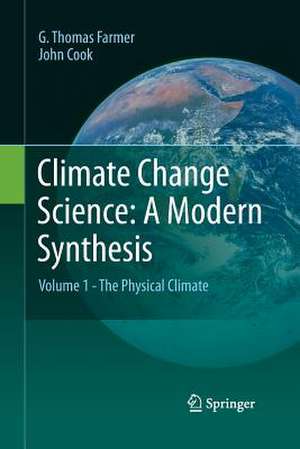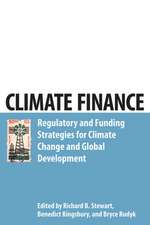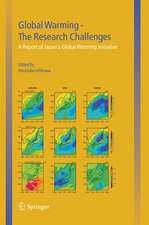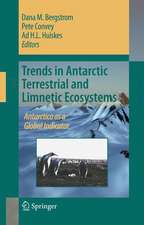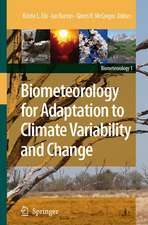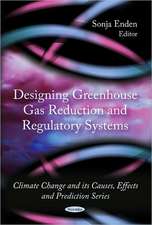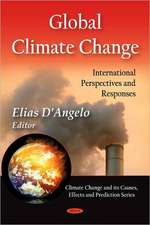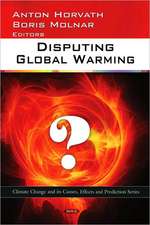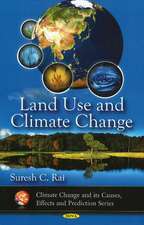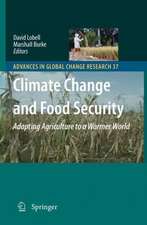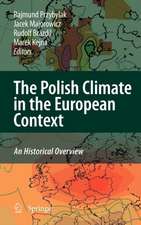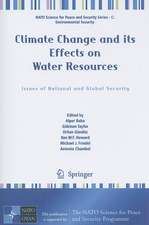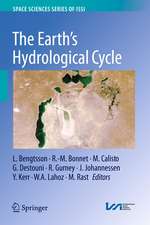Climate Change Science: A Modern Synthesis: Volume 1 - The Physical Climate
Autor G. Thomas Farmer, John Cooken Limba Engleză Paperback – 28 iun 2015
| Toate formatele și edițiile | Preț | Express |
|---|---|---|
| Paperback (1) | 598.50 lei 6-8 săpt. | |
| SPRINGER NETHERLANDS – 28 iun 2015 | 598.50 lei 6-8 săpt. | |
| Hardback (1) | 806.70 lei 6-8 săpt. | |
| SPRINGER NETHERLANDS – 12 ian 2013 | 806.70 lei 6-8 săpt. |
Preț: 598.50 lei
Preț vechi: 704.12 lei
-15% Nou
Puncte Express: 898
Preț estimativ în valută:
114.56€ • 124.48$ • 96.29£
114.56€ • 124.48$ • 96.29£
Carte tipărită la comandă
Livrare economică 21 aprilie-05 mai
Preluare comenzi: 021 569.72.76
Specificații
ISBN-13: 9789400797321
ISBN-10: 940079732X
Pagini: 592
Ilustrații: XXVIII, 564 p.
Dimensiuni: 155 x 235 x 35 mm
Greutate: 0.82 kg
Ediția:2013
Editura: SPRINGER NETHERLANDS
Colecția Springer
Locul publicării:Dordrecht, Netherlands
ISBN-10: 940079732X
Pagini: 592
Ilustrații: XXVIII, 564 p.
Dimensiuni: 155 x 235 x 35 mm
Greutate: 0.82 kg
Ediția:2013
Editura: SPRINGER NETHERLANDS
Colecția Springer
Locul publicării:Dordrecht, Netherlands
Public țintă
Lower undergraduateCuprins
1. Introduction.- Part I - Scientific principles and the scientific method.- 2. scientific principles.- 3. The scientific method and its use.- Part II - Overview of climate change science.- 4. Earth’s energy budget.- 5. Climate change trends.- 6. Earth’s surface temperature.- 7. Climate change science as earth science.- Part III - Earth’s atmosphere.- 8. Introduction to earth’s atmosphere.- 9. Carbon dioxide, other greenhouse gases, and the carbon cycle.- 10. Earth’s albedo, radiative forcing and climate change.- 11. Atmospheric circulation and climate.- Part IV - The world ocean and climate.- 12. The world ocean.- 13. Ocean heat content and rising sea level .- Part V - Earth’s cryosphere and recent climate history.- 14. Glaciers and the latest ice age.- 15. Permafrost and methane.- Part VI - Land and its climates.- 16. Continents and mountain ranges.- 17. Climate classifications.- Part VII - Climate models.- 18. Types of models.- Part VIII – Climates of the past (paleoclimatology).- 19. Paleoclimates and proxies.- 20. Climates of the recent past.- 21. Pleistocene glaciations.- Part IX - Future climates and mitigation.- 22. Projections of future climates.- Part X - Skeptics and deniers of global warming.- 23. Understanding climate denial.- Part XI - Specific declarations against climate science and climate scientists.- 24. Rebuttals to climate myths.- Index.
Recenzii
From the book reviews:
“Climate Change Science: A Modern Synthesis is the latest entry in a small but growing field of texts aimed at students in introductory college courses in climate science. … The book clearly acknowledges the broadly interdisciplinary nature of climate change science, with 22 chapters covering a wide range of topics in climate science. … the book is designed so that the chapters can largely stand on their own and an instructor can pick and choose which topics to emphasize.” (Jonathan Cole, Reports of the National Center for Science Education, Vol. 34 (4), July-August, 2014)
“This book is the first of a two-part series focused on Earth’s climate in the past, present, and future. Volume 1 deals with physical aspects of climate science and provides a broad introduction to scientific inquiry and the history of the discipline, followed by detailed descriptions of climate system components and their importance in a climate change context. … this volume may also be a useful reference for people working in climate-related disciplines. Summing Up: Recommended. Upper-division undergraduates, graduate students, researchers/faculty, professionals.” (J. Schoof, Choice, Vol. 51 (4), December, 2013)
“Climate Change Science: A Modern Synthesis is the latest entry in a small but growing field of texts aimed at students in introductory college courses in climate science. … The book clearly acknowledges the broadly interdisciplinary nature of climate change science, with 22 chapters covering a wide range of topics in climate science. … the book is designed so that the chapters can largely stand on their own and an instructor can pick and choose which topics to emphasize.” (Jonathan Cole, Reports of the National Center for Science Education, Vol. 34 (4), July-August, 2014)
“This book is the first of a two-part series focused on Earth’s climate in the past, present, and future. Volume 1 deals with physical aspects of climate science and provides a broad introduction to scientific inquiry and the history of the discipline, followed by detailed descriptions of climate system components and their importance in a climate change context. … this volume may also be a useful reference for people working in climate-related disciplines. Summing Up: Recommended. Upper-division undergraduates, graduate students, researchers/faculty, professionals.” (J. Schoof, Choice, Vol. 51 (4), December, 2013)
Textul de pe ultima copertă
Climate Change Science: A Modern Synthesis introduces the principles of climate change science, emphasizing the empirical evidence for climate change and a warming world. Divided into eleven sections, this comprehensive book opens with an introduction to basic scientific principles including the scientific method, the laws of thermodynamics, the gathering and interpretation of data, biographical notes on a few of the giants of science and their contributions, profiles of selected climate change scientists and their contributions, Newton’s laws of motion and more.
The remaining sections include an Overview of Climate Change Science; Earth’s Atmosphere; The World Ocean and Climate; Earth’s Cryosphere and Climate History; Land and Its Climates; Climate Models; Paleoclimatology; Future Climates and Mitigation; Skeptics and Deniers of Global Warming and Specific Declarations against Climate Science and Climate Scientists. The book offers extensive coverage of the major aspects of climate change and its effects and interactions with the atmosphere, the World Ocean, glaciers and land. Modeling the Climate receives its own chapter, and there are sections on past climates and a chapter outlining the ideas of climate change skeptics and deniers and the scientific evidence that either refutes or substantiates their claims.
Each chapter opens with a list of “Things to Know.” The book goes on to offer chapter-length discussion of the atmosphere, biosphere, geosphere, hydrosphere and anthroposphere and their inter-relationships and much more. Designed as an introductory text for use at the undergraduate level, Climate Change Science assumes no science background on the part of the reader.
The remaining sections include an Overview of Climate Change Science; Earth’s Atmosphere; The World Ocean and Climate; Earth’s Cryosphere and Climate History; Land and Its Climates; Climate Models; Paleoclimatology; Future Climates and Mitigation; Skeptics and Deniers of Global Warming and Specific Declarations against Climate Science and Climate Scientists. The book offers extensive coverage of the major aspects of climate change and its effects and interactions with the atmosphere, the World Ocean, glaciers and land. Modeling the Climate receives its own chapter, and there are sections on past climates and a chapter outlining the ideas of climate change skeptics and deniers and the scientific evidence that either refutes or substantiates their claims.
Each chapter opens with a list of “Things to Know.” The book goes on to offer chapter-length discussion of the atmosphere, biosphere, geosphere, hydrosphere and anthroposphere and their inter-relationships and much more. Designed as an introductory text for use at the undergraduate level, Climate Change Science assumes no science background on the part of the reader.
Caracteristici
Volume One of a two-volume treatment of climate change science designed for an introductory science course Describes the discipline of Climate Change Science, and individual climate change scientists whose expertise spans Earth history, geology, geography, biology, oceanography, astronomy, mathematics, physics, chemistry, engineering and more Examines evidence of global warming that has entered mainstream discussions of climate change Discusses the ideas and tactics of climate skeptics and deniers
